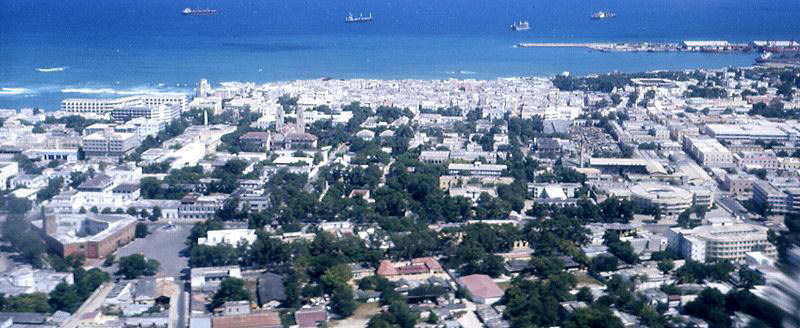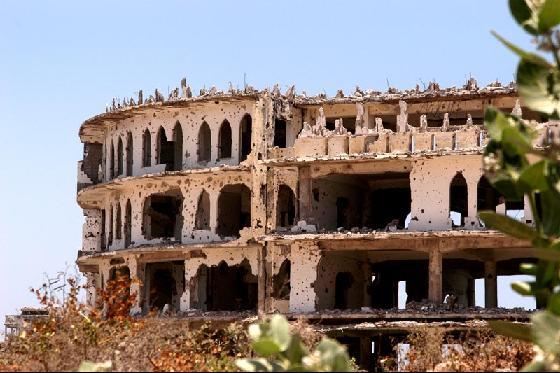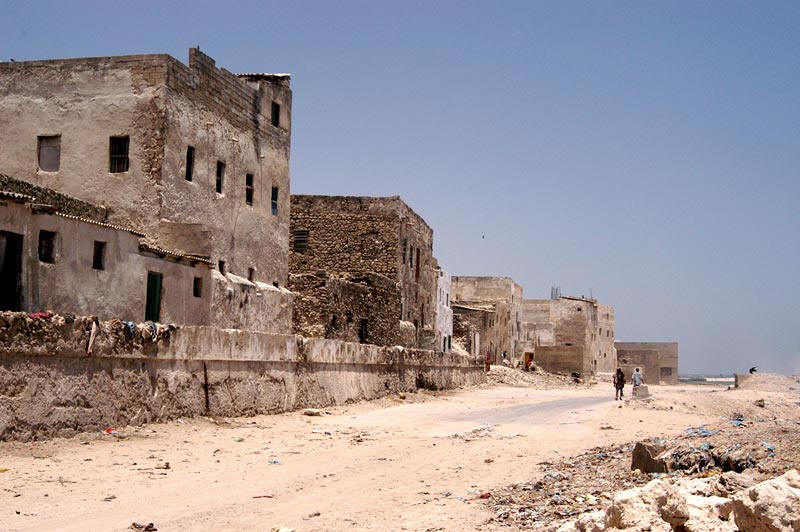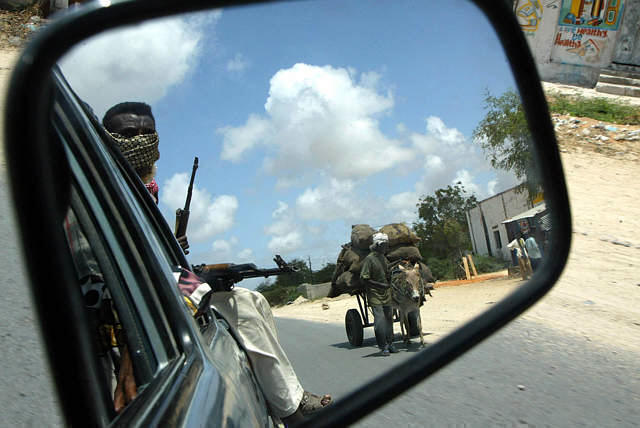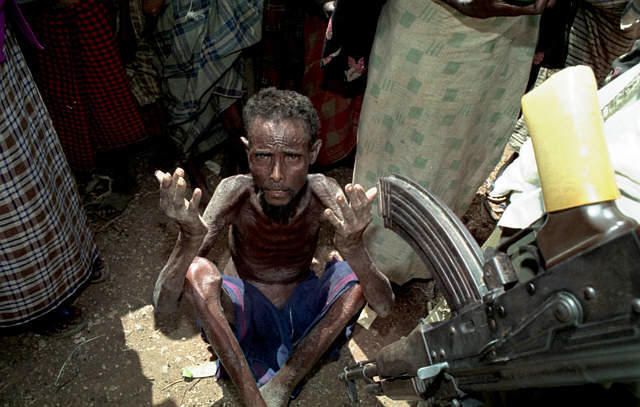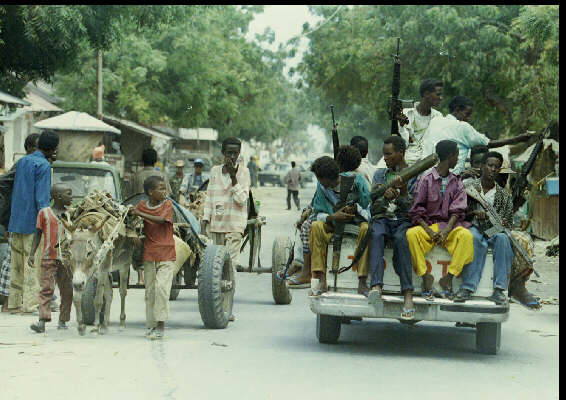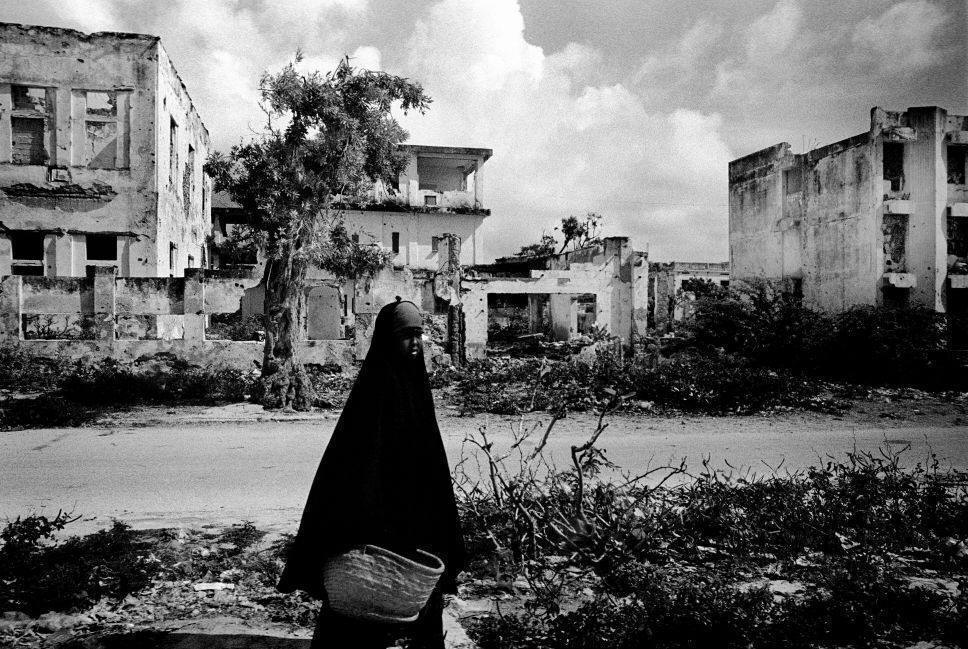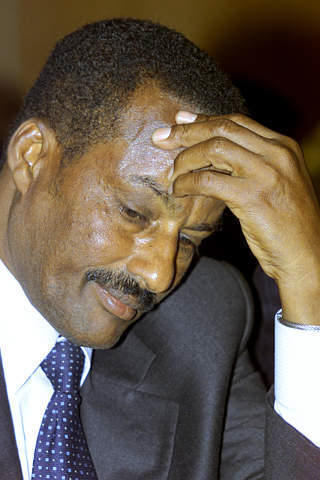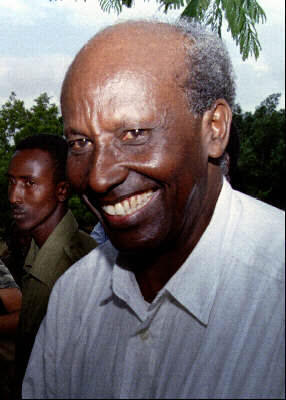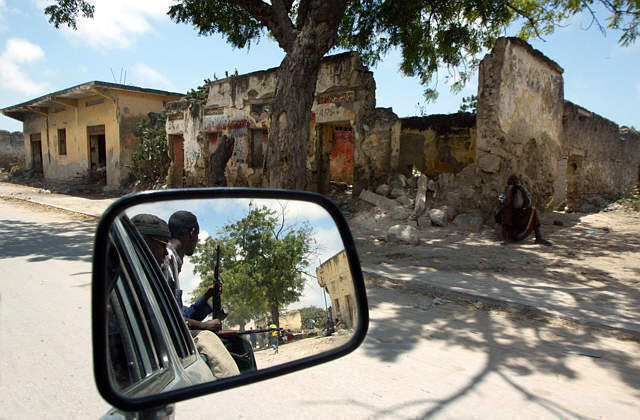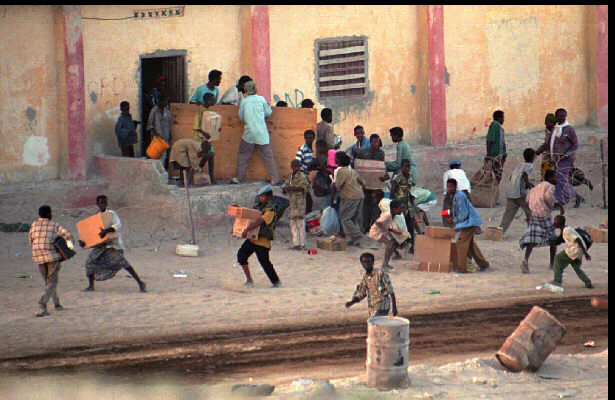Suicide of a Nation
Somalia descends
into inferno of
chaos
By
Paul Watson
February 16, 1992
The Toronto Star
MOGADISHU
-- Something has
snapped in Somalia.
After three months
of civil war that
has killed and
wounded at least
30,000 people, the
country's soul is
dying. People here
are so used to
staring into war's
hideous face that
too many have lost
the horror. The
brutal fighting is
now their chief
entertainment.
Some 400,000
terrified Somalis
have fled for their
lives.
Many live in the
desert in tiny
beehive huts made of
scrap metal and
cardboard bound
together with rope
and rubber straps.
Thousands more
civilians have
stayed in Mogadishu,
braving machinegun
fire and artillery
barrages that batter
the city each day.
In a residential
district controlled
by the guerrilla
leader trying to
oust Somalia's
interim president,
hundreds of people
turn out to see the
street battles close
up. Even kids ignore
the sharp crack of
assault rifles,
crowding sidewalks
near the frontline
to watch tanks blast
the next
neighborhood. As the
country commits
suicide, spectators
cheer each explosion
while families of
the dead and wounded
weep.
It is the Hobbesian
vision come true, a
society collapsed
into anarchy, a
savage, pitiless
world where life has
become nasty,
brutish and short.
People who once
loved and laughed
and hoped like all
of us now think only
of staying alive one
more day, of saving
enough strength to
survive another.
It's a miracle that
so many still can.
The barbarity is
beyond exaggeration.
Somalia hasn't had a
government or police
for more than a
year. Most people
haven't had a job or
a regular paycheque
for even longer.
Thousands of
convicts who escaped
from jail amid the
chaos run amok with
assault rifles and
machineguns,
shooting anyone who
gets in their way.
The few drivers
still on the road
have to fill the
back seat, and often
the open trunk, with
armed guards for
protection.
At night, the city
is pitch black
except for the
intermittent flash
of artillery. There
hasn't been any
electricity for
months, nor is there
any running water in
most of the city.
Looters hacked down
all the hydro wires,
dug up the water
mains and sold them
in neighboring
countries along with
the cars, computers,
phones, light
fixtures and
truckloads of other
booty they stole at
gunpoint.
Thousands of
refugees living in
the desert around
Mogadishu can draw
water from wells but
they have no food
and can't afford to
buy any. Most are
trying to survive on
tea and scraps of
bread.
In the small section
of Mogadishu still
controlled by the
country's nominal
president, Somali
surgeons operate on
war casualties in
abandoned houses. In
one living-room
operating theatre, a
woman was lying
unconscious on a
wooden table while a
surgeon rooted
around in a gaping
wound in her abdomen
picking out bits of
shrapnel.
A wide-eyed little
boy was wandering
around the operating
room, stretching up
on the tips of his
bare toes to see the
man with half his
cheek blown off. The
windows beside the
operating table were
wide open so glass
wouldn't fly across
the room if an
artillery shell
exploded nearby.
No one on the
surgical team wore a
mask. There's no
point worrying about
germs in a room
about as sanitary as
a garage. A rattling
old fan whirled next
to the operating
table, bothering a
swarm of flies just
enough to keep them
out of the open
wound. While a
volunteer nurse
mopped up pools of
coagulating blood,
more victims lay
moaning and bleeding
on the floor.
The skilled Somali
surgeons do their
best, Western relief
workers say. But
they have no
training in war
surgery and often
make terrible
mistakes, such as
sewing up wounds
that should be left
open to drain.
Gangrene often sets
in and victims end
up losing limbs, or
dying when they
could easily have
been saved.
The international
Red Cross, the only
relief agency that
crossed the
frontline to put
physicians into
northern Mogadishu,
was converting an
empty prison into a
well-equipped field
hospital.
But the Red Cross
workers had to flee
the area Thursday
after guerrillas
bombarded the only
airstrip. Dozens of
people were killed
or wounded as the
mortars rained down
in the stepped up
assault. Some of the
bombs hit the very
houses where
surgeons were trying
to keep the wounded
alive.
Fierce fighting
resumed in Mogadishu
yesterday morning,
just hours after
representatives of
the two main warring
factions signed
separate commitments
to stop fighting
after talks at the
United Nations.
On a continent
synonymous with
civil war and
starvation, Somalia
was supposed to be
different. It's an
African oddity, a
country where
everyone belongs to
the same ethnic
group, speaks the
same language and
adheres to the same
religion: Islam.
Yet that common
cultural thread
wasn't enough to
prevent the country
from unravelling
into a tangled mess
of rival sub-clans
ruled by petty
warlords.
Ali Mahdi Mohamed, a
hotel owner named
interim president of
Somalia at a meeting
of guerrilla groups
last July, says he's
defending his
government against a
coup.
Gen. Mohamed Farah
Aideed, the
guerrilla leader who
helped oust former
dictator Mohamed
Siad Barre a year
ago, insists Ali
Mahdi is a crook who
must be arrested and
put on trial.
Ali Mahdi says he
would gladly meet
Aideed in court and
vows to fight to the
end keep the general
from seizing power.
"We lost thousands
and thousands of
people for
democracy,"
Ali Mahdi said
during a recent
interview in his
northern enclave.
"We will not accept
again a military
dictatorship
The combined
destruction of the
battle to remove
Barre and the past
three months of
urban warfare has
left about 80 per
cent of Somalia in
ruins, according to
Ali Mahdi.
Even if he and
Aideed ever agree on
a formal ceasefire,
it's hard to imagine
their followers
simply falling into
line and laying down
their arms. Most of
them aren't
disciplined troops
dressed in uniforms.
They're wild
warriors who fight
for pillage,
pleasure and some
perverted sense of
honor.
Thousands of gunmen
cruise the city day
and night like
barracudas on a
hunt. Most have a
crazed glint in
their eyes from
chewing bundles of
ghat, a bitter plant
that delivers a
sharp amphetamine
kick. Even little
boys no older than
10 carry loaded
rifles and give
orders at
checkpoints in this
bizarre war zone.
Only foreign troops
could restore order
and disarm Somalis,
maybe by buying
their weapons with
food, Ali Mahdi
argues.
But Aideed refuses
to accept outside
intervention,
probably because he
holds the upper hand
in the battle for
control of
Mogadishu.
Besides, the general
says with a wry
smile, Somalis are
very attached to
their guns.
"Traditionally,
Somalis love very
much weapons, horses
and camels. Most of
our people are
nomads, over 70 per
cent in rural areas,
and the weapons can
be used for self-defence.
Many times people
also give rifles as
a gift or dowry to a
family when they are
asking to marry."
For centuries,
Somalia was a
desolate land of
nomads with little
to offer the world
except camels and
frankincense, one of
the Magis' gifts to
the newborn Christ.
But during the Cold
War, Somalia had
something new for
sale: naval bases
for superpowers
competing to control
access to the Red
Sea's oil shipping
lanes.
As the Soviets and
Americans bid for
Barre's favor, one
of the poorest
countries on Earth
built up a massive
army and air force
equipped with some
of the best killing
machines on the
market. Now the
fighters and bombers
are wrecked and
rusting on the
tarmac, so the
guerrillas found a
new use for four-barrelled
anti-aircraft guns
that can pump out
about 600 rounds a
minute. They shoot
them at people.
Somalia's acting
U.N. ambassador,
Fatun Mohamed
Hassan, begged the
United Nations
Security Council
last week to hurry
up and do something,
anything, to end the
madness.
"Let me assure the
council that any
measures - even if
coercive - to
resolve the current
crisis in Somalia
cannot and will not
be interpreted as
interference in our
internal affairs,"
he said. "The Somali
people (are)
pleading with you to
stop the bleeding of
their country."
� Copyright 1992 The
Toronto Star
U.N. warrior has
nightmares about
Somalia
By
Peter Smerdon
February 16, 1994
MOGADISHU,
Feb 16 (Reuter) - He
landed a gung-ho
warrior to save
Somalia from
warlords looting
food aid. He leaves
a year later for
home next month,
bitter and troubled
by what he saw.
The United Nations
Operation in Somalia
(UNOSOM) set
conditions for a
journalist to
interview its
peacemaker. He could
speak candidly but
had to be identified
only as a U.N.
military official.
His country, rank
and job were not
allowed to be given.
Looking back
uncomfortably on his
year in a land he
hardly knew before
arriving, he says he
has
nightmares about the
Somalia experience.
The Security Council
has finally scaled
back its grandiose
drive for aggressive
peacekeeping. UNOSOM
will limp on for a
year after the
United States and
other mainly Western
forces pull out by
the end of March.
But the alarm bells
for renewed civil
war are already
ringing.
The original aim of
UNOSOM to push
reconciliation and
reconstruction was,
the official says,
the logical next
step for this
war-shattered Horn
of Africa country
after the end of the
famine, which
prompted U.S.
intervention.
But then came
problems. Warlord
Mohamed Farah Aideed
and his Somali
National Alliance (SNA)
opposed U.N.
intervention.
"There was a (U.N.
and U.S.) lack of
recognition of what
problems there were.
Has it been a total
failure?...To the
SNA people, UNOSOM
would have failed
whatever happened,"
he says.
"In that regard
conflict was
inevitable. It
started as a
political and
propaganda conflict
and then became a
military one, which
was inevitable
because the SNA
wanted it that way."
"We began taking
casualties on June 5
(last year) and took
them at the rate of
one per day," he
says. "The SNA of
course took vast
numbers of
casualties and the
militias were
strained to breaking
point.
"But they had the
advantage of time.
They could protract
the conflict...They
knew the coalition
members couldn't
afford politically
to take casualties
in Somalia. The
populations at home
weren't prepared to
accept casualties
for this mission."
He says U.S. forces
again miscalculated
by thinking they
could easily
overcome Aideed's
200 rag-tag
militiamen. And as
the U.N. body count
kept rising, its
will to fight waned.
"We could have
captured Aideed. A
military solution
has a cost and when
the conflict began
it wasn't clear what
the cost was," he
says and pauses. "It
became very clear on
October 3."
"We learned the
cruelties of war.
Compared with the
Gulf War this was a
real war. It was up
front and personal,
right in front of
your eyes," says the
official, who
accompanied units in
combat.
"In the Gulf War it
was watching a TV
screen and the bombs
going in. You didn't
have to think what
happened to the
people in the
building when it was
hit.
"But here, you saw
the faces close up
of the people in the
building. You saw
the women and
children killed,
and the women and
children used as
human shields.
You saw them
dragging American
bodies through the
streets. There was
nothing hidden.
"All the ugliness of
war was right there
slap in your face.
And there is a
certain ugliness to
war...It was much
more distasteful in
Somalia than any
other U.N. action up
to now.
"And the SNA knew
that. The SNA knew
that just to keep
killing would unify
the world (to pull
its U.N. forces
out)."
He has special
hatred for Aideed,
who for four months
evaded a U.N.
manhunt featuring
Wild West-style
$25,000 reward
posters for his
capture. After 18
U.S. servicemen were
killed in a battle
on October 3 the
United Nations
abandoned the
search.
"Was the decision to
capture Aideed
flawed? When it was
made a full
understanding of the
consequences was not
realised... They
certainly had the
capability to take
casualties among
U.S. forces.
"We couldn't
overcome them with
just firepower," he
says.
The U.N. retreated
from its ambitious
role-model for
peacekeeping
operations in world
troublespots after
President Bill
Clinton ordered a
total U.S.
withdrawal by March
31 and tried to
court Aideed to talk
peace.
The official says:
"All the propaganda
in the world will
never erase the fact
that Aideed is a
criminal, a murderer
and a warlord.
He killed thousands
of his own people
even before the U.N.
arrived here.
"If
you ask a Somali
about Aideed he
doesn't say he has
built hospitals. He
hasn't done a single
thing for the
people. They know he
is a murderer. He
got off lightly. And
in the end it never
mattered that he got
away with murder
here."
Asked whether he
believed the Somalia
mission could never
have succeeded, he
says everything
depended on the U.N.
will.
"There will always
be the potential for
battles as long as
there are Somali
terrorists who still
don't want UNOSOM in
Somalia,"
he says. He accuses
the U.N. of awarding
building contracts
to a SNA-controlled
corporation to
appease Aideed.
Asked if withdrawing
U.S. forces would
hit back against a
large attack, he
says he thinks they
would only leave
faster.
"The response to a
massive attack would
only be political. I
don't think that we
are going to destroy
anymore. We're on
our way out. We
aren't going to kill
anyone, anymore."
©
1994 Reuters Limited
